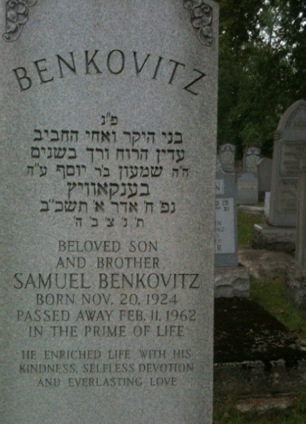
My father Sam's Yahrtzeit falls between January 27th, the International Holocaust Memorial Day adopted by the United Nations in 2005, and Yom HaShoah, the Holocaust Remembrance Day established in 1951 by the Knesset. For 49 years I thought my father died on the 9th of February, 1962, but learned last year when my cousin emailed me a picture of his grave that he had died on the 11th. I was born on the 9th of November of the same year, and it had always felt meaningful to me that I was born exactly nine months after his death. I now know it was nine months and two days, yet the meaning still holds.

Nine months: the accepted gestation of a human life that shows its presence as an electric beat even before there is a heart to hold it. The fact that I entered the world as a beat without a heart just as his heart stopped beating has always filled me with a sense of the relay of life. We're here to make meaning in the short time we're given, and at the end of our passionate sprint and just as we are running out of steam we hand the baton to the next person who is waiting expectantly, pure nascent longing to burst out and into their own stretch clutching the baton. I remember the intramural games in grade school. What it felt like to know that there was someone up ahead waiting for the baton, your teammate, your kin, waiting to rip the baton out of your hands and take it home to the exhilaration of victory or, if not, at least the satisfaction of an effort, in community. And, too, what it felt like to wait for the baton to arrive, how you could feel your feet running even as you stood stock still in wait as you watched your fellow sprinter run toward you with all their might and hope, and next, how you could feel the baton in your own hands before you even touched it just by connecting with your teammate's fast approaching gaze.
We live at an important time in post-Holocaust history. In Los Angeles, the second largest Holocaust survivor community in our country and the fifth in the world, we live, we Jews and Christians and Buddhists and Muslims and atheists, with our heartbeats as common ground. We live among and aside an extraordinary group of elders -- those who can, if they choose to and are able, speak to us in real time about this chapter in modern history that is unprecedented and lifetimes later still equally incomprehensible and heartbreaking.
And it is they who hold the baton now, some standing still in wait of the right invitation to reveal for the first time, and others more seasoned who hit the roads from morning to night, from museums to classrooms to meetings. They carry with them totes that contain their material evidence -- a document, a newspaper clipping of their story, a book they have written, and if they are lucky, a photo or two. They do this with one goal in their heart, as child survivor Eva Brettler, who paraphrases Elie Wiesel, explains, "to speak for their family members and friends and neighbors who cannot speak for themselves."
This year, in the days around January 27th and Yom HaShoah, reach out to hear the voices of legacy and offer up your heart and your conscience to be changed and emboldened. At the Los Angeles Museum of the Holocaust and The Shoah Institute, at The Museum of Tolerance and in synagogues and churches, at colleges and universities, and at local libraries and community centers. Find your place in this story.